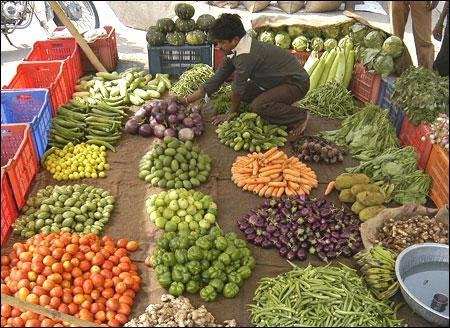 | « Back to article | Print this article |
India's headline inflation seen picking up in Nov
Indian data due out on Friday is expected to show inflation accelerated in November because of a weak rupee and festive consumer demand, dampening any lingering hopes of a central bank rate cut next week to boost the stuttering economy.
A Reuters poll forecast the wholesale price index , India's main inflation measure, rose an annual 7.6 per cent in November, up from 7.45 per cent in October.
Asia's third largest economy is headed for the weakest full-year growth in a decade, at about 6 per cent, far below the near double-digit pace before the global economic downturn.
But despite the slowdown, the Reserve Bank of India (RBI) has not lowered interest rates since April because inflation has remained near seven percent, exacerbated by a weak rupee that has added to the cost of fuel imports.
"We expect that repo rate would be held in next week's policy. Inflation is likely to remain around 7.6 percent for the full year, though there may be some easing in the fourth quarter," said Adity Nayar, an economist at rating agency ICRA.
The bank has said any interest rate cut is "highly improbable" at the next policy meeting on Dec 18.
That stance was supported by data released earlier this week showing that October industrial output unexpectedly leapt to 8.2 percent growth after contracting the previous month.
Some economists do predict a cut in the cash reserve ratio (CRR), the deposits that banks keep with the central bank, to help liquidity, possibly followed by a rate cut in January.
Data on Wednesday showed that retail inflation, a relatively new index less closely watched than WPI, moved to near double-digits in November driven by a spike in food prices.
Diwali and other religious festivals in November are traditionally a period of high consumption, which can push prices higher.
The inflation data also reflects pressure on fuel prices, resulting from the rupee's 1 percent depreciation in November. India imports 80 per cent of its oil needs, and the crude oil import bill rose 16.8 per cent in November from a year ago to $14.5 billion, despite lower global prices.
India's chief economic advisor Raghuram Rajan cautioned against reading too much into the spike in industrial output numbers, which partly reflected statistical differences due to the timing of the festival season.
"Clearly, we should not be overly influenced by one number," Rajan said. "We should take it as part of a pattern. That hopefully, economic growth is stabilising, and that we have to wait and see whether it starts strengthening."
Other bright spots include an uptick in investment in recent months and a surge in infrastructure output.
But the fiscal deficit, like inflation, remains the highest among the BRIC group of emerging economies, that also includes Brazil, China and Russia.
Rating agency Standard & Poor's warned again on Tuesday that India's credit rating faces a one-in-three chance of being downgraded to junk over next 24 months because of a heavy debt burden and the fiscal deficit, which is seen overshooting a target of 5.3 per cent in the fiscal year ending in March.
Hurt by a slow global recovery and uncertainty in the euro zone, India's exports have slumped this year, contracting 6 per cent during the April-November period.
Economists say any recovery is likely to add to inflationary pressures in the short term as capacity becomes stretched by domestic demand for consumer goods, housing, and rising capital investment by industry.
Finance Minister P Chidambaram is banking on small policy steps including selling stakes in state-owned companies to attract capital inflows that could strengthen Indian rupee and help bringing down inflation. In the longer term, the government is trying to end supply bottlenecks by upgrading infrastructure.
Additional reporting by Subhadip Sircar in Mumbai

© Copyright 2024 Reuters Limited. All rights reserved. Republication or redistribution of Reuters content, including by framing or similar means, is expressly prohibited without the prior written consent of Reuters. Reuters shall not be liable for any errors or delays in the content, or for any actions taken in reliance thereon.
